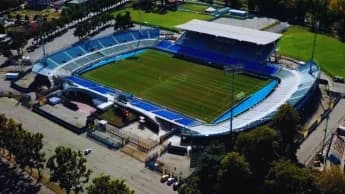
Estadio Azteca stands as a monument to football culture, hosting monumental matches while providing fans an unforgettable experience in the vibrant heart of Mexico City.
Nestled in the lively city of Mexico City, Estadio Azteca holds the title of being the largest football stadium in Latin America and ranks among the most iconic venues globally. With a seating capacity of 87,523, it serves as a monument to football culture, home to the prominent Club América and the Mexico national team. Perched at an elevation of 2,200 meters (7,200 feet) above sea level, the stadium provides fans with a distinctive atmosphere that enhances the thrill of every game.
This venue, created by the esteemed architects Pedro Ramírez Vázquez and Rafael Mijares Alcérreca, commenced construction in 1961 and officially opened in 1966. It swiftly established itself as a representation of Mexico’s dedication to athletic excellence, fusing contemporary architectural design with the vibrant spirit of the Mexican populace.
As one of the largest and most esteemed football stadiums in the world, Estadio Azteca remains a vital component of significant football events, going beyond being merely a venue. It is a landmark that embodies the essence of international football and the broader sports culture.
Legendary Matches
The storied history of Estadio Azteca is marked by the many legendary matches that have taken place within its confines, solidifying its reputation as a cornerstone of football. The stadium is famous for hosting two FIFA World Cup finals; the first in 1970, where Brazil emerged victorious against Italy with a score of 4–1, and the second in 1986, when Argentina triumphed over West Germany with a score of 3–2. These finals are immortalized in football history, with the stadium serving as the setting for some of the sport's most memorable moments.
One of the most renowned matches in the stadium's history took place during the quarterfinals of the 1986 World Cup, featuring Argentina against England. The breathtaking 'Hand of God' goal and the 'Goal of the Century' by Diego Maradona in this match are among the most significant moments in football lore. Estadio Azteca served as the backdrop for both of these iconic goals, further cementing its legacy as a place where history is created.
In addition to hosting World Cup finals, the stadium has been the site of many dramatic matches, including the famous 1970 semifinal between Italy and West Germany, often referred to as the 'Game of the Century.' This thrilling match ended with a 4–3 victory for Italy, captivating an electric crowd and enhancing the stadium’s reputation as a premier venue for unforgettable football experiences.
Amenities & Services
The distinctive architecture and facilities of Estadio Azteca make it stand out among football stadiums worldwide. Over the years, the venue has been renovated multiple times to ensure it remains a leading example of modern sports venues while preserving its historical appeal. Notably, in 2015, modern Panasonic LED panels were installed at both the north and south ends of the stadium as part of a comprehensive renovation initiative.
The stadium features an expansive seating layout that guarantees an excellent vantage point for every spectator. With a capacity exceeding 87,000, the enormity of the venue creates an impressive atmosphere, allowing fans to experience the thrill of the event, whether they are positioned near the field or higher up in the stands.
Besides its expansive seating, Estadio Azteca boasts advanced facilities, such as VIP boxes, luxurious suites, and contemporary media areas, all aimed at enhancing the experience for fans. These amenities provide spectators with exceptional views of the game while enjoying superior comforts.
Significance in History
Since its inauguration, Estadio Azteca has been a pivotal venue in the realm of international football. Being the first stadium to host two FIFA World Cup finals has cemented its place in the global football narrative. The finals of 1970 and 1986 are not merely significant events in the tournament's timeline but are also key moments in the sport's history, showcasing some of the most iconic footballers ever.
The stadium played a significant role during the 1968 Summer Olympics by hosting the football final, further establishing its reputation as a premier sports venue. In addition to football, Estadio Azteca has become a cultural icon, hosting major events such as concerts by Michael Jackson, U2, and Paul McCartney, among others, demonstrating that the stadium goes beyond its athletic origins.
For the Mexican national football team, Estadio Azteca has acted as a stronghold and a source of pride, where significant victories have taken place. It continues to be the preferred venue for the national team’s crucial matches, highlighting its significance in the cultural and historical landscape of sport in Mexico and beyond.
Forthcoming Events
As we look to the future, Estadio Azteca is poised to uphold its reputation for hosting international football events, with the 2026 FIFA World Cup approaching. The stadium has been chosen to hold the tournament's opening match, signifying an extraordinary third occasion that it will contribute to the legacy of the World Cup.
Beyond the World Cup, the stadium is set to accommodate numerous matches, comprising both group stage contests and knockout phases, as the tournament progresses throughout the United States, Canada, and Mexico. This event represents a major milestone in the stadium's legacy, reinforcing its status as one of the elite football venues worldwide.
Preparations for these events will include renovations aimed at enhancing the stadium's infrastructure, featuring improved seating arrangements and a refreshed façade. These enhancements will ensure that Estadio Azteca continues to be a leading venue in global football, poised to host fans for yet another generation of remarkable matches.
Fan Experience
Experiencing an event at Estadio Azteca is truly exhilarating. This grand stadium, steeped in history and offering breathtaking views, creates a distinctive atmosphere that blends excitement, tradition, and cultural pride. Whether cheering for Club América as they face their rivals or watching the national team take on the world stage, fans encounter an exhilarating environment that is hard to find in any other stadium.
This venue has been thoughtfully designed with the fan experience in mind, featuring various amenities to enhance every matchday. It includes a variety of food and drink options, merchandise stands, and fan engagement areas where supporters can connect with the team’s history prior to the game starting.
For spectators attending international events, the atmosphere is heightened, as fans from around the globe unite to witness incredible moments unfold. Estadio Azteca’s capacity to host both sports and cultural events truly distinguishes it as a remarkable venue, where the experience extends far beyond the game itself.





